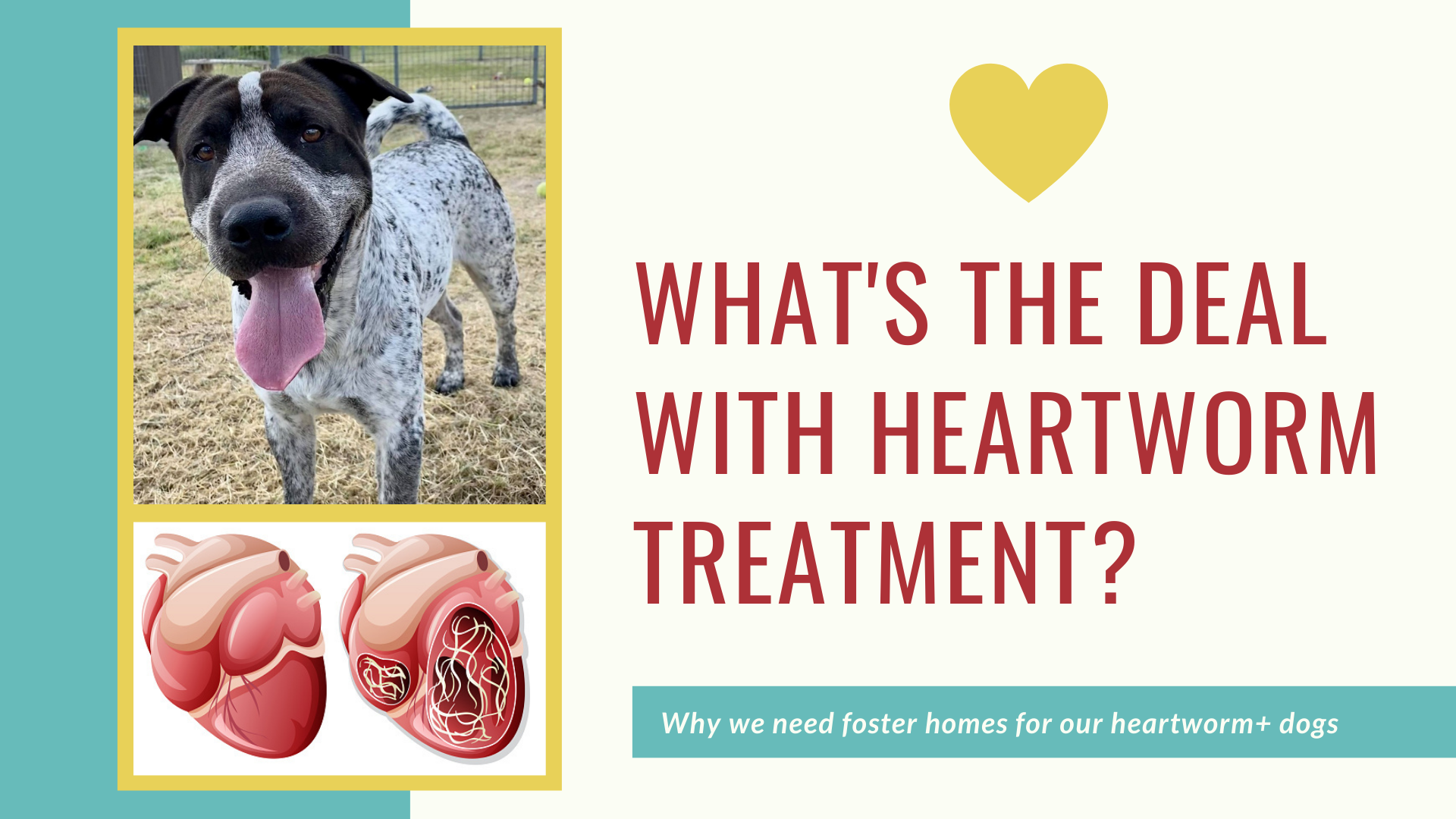Why can’t heartworm positive dogs be treated at the shelter? We get this question A LOT. While we would love to be able to treat every dog at the shelter, it’s actually quite dangerous for a dog to undergo heartworm treatment while in a stressful shelter environment. Because the treatment is pretty invasive and tough on the body, every heartworm positive dog must be in a calm environment inside of a foster home in order to have the best chance of successfully treating and eliminating their heartworms.
This means no loud noises, no high stressors, and containment to a small area like a crate for minimal movement. You can imagine why a shelter isn’t the best place for heartworm treatment now, can’t you? We have traffic in and out all day, dogs barking nonstop, and only a small area with minimal enrichment and stimulation (to say the least). This is why getting a heartworm positive dog into a foster home ASAP is one of our biggest priorities and most needed demands. Once the dog is placed in a foster home, then treatment can commence!
Most of the time, money for the treatment is not an issue and we usually have a donor to help out. However, without a foster home, nothing can be done. We are ALWAYS looking for foster homes for our heartworm positive dogs.
Can’t foster? Call us up at 830-629-5287 to ask about funding heartworm treatment for one of our many heartworm positive dogs!
THE DL ON HEARTWORMS
What are heartworms?
Heartworms are caused by a parasitic roundworm called Dirofilaria immitis. This parasitic roundworm larvae is spread through the bite and blood transfer via mosquitoes. Even though dogs are the primary host of Dirofilaria immitis, other animals can also be affected by this parasite including cats, coyotes, foxes, ferrets, bears, and seals. In extremely rare circumstances, even humans can be affected! All dog breeds are susceptible, especially in our area in Central Texas, where we have many mosquitoes due to the river environment around New Braunfels.
What is their impact on the body?
Heartworms start out as small microfilaria that can be seen in the blood of an infected host. For dogs, adult heartworms may make their way to the arteries of the lungs, and later into the heart itself. This causes breathing issues, heart problems, lethargy, and eventually death if an animal is left untreated. Just imagine….if blood cannot be pumped efficiently, then vital nutrients, like oxygen, is unable to reach the rest of the body. Do NOT try to self diagnose. Contact your veterinarian immediately for an official heartworm test and diagnosis. We cannot stress this enough!
First Warning Signs
Extreme fatigue and coughing are some of the first warning signs of a heartworm infection. Usually, by the time heartworm symptoms appear, it might mean that the heartworm infection has spread to the lungs. This is why it is SO IMPORTANT to have your animal on heartworm prevention. It is better to prevent a heartworm infection than treat. By the time treatment commences, your pet might have irreversible damage to their lungs, heart, and/or pulmonary system.
How are they contracted?
As mentioned above, the infected blood is carried by affected mosquitoes from host to host. This means that if your dog is located in close proximity to another heartworm infected dog, the chances could be higher for your dog to be infected. They cannot be spread from one pet to another pet directly. It will require the bite and blood transfer of a mosquito. For example, if you live in a prime area for mosquitoes, then it may be more likely that one pet is bit, and their blood could be transferred to another pet via the mosquito, but never straight from one pet to another.
What is the treatment?
You will need to talk to your vet about the right treatment for your pet, but treatment, time, intensity, and cost may vary, and they are all prescription via a veterinarian (DO NOT try to treat yourself with feed store drugs. This may lead to severe damage to your pet’s internal organs and maybe death). Treatments can cost anywhere from $500 to over $1000. With all of the preventions available today, plus the irreversible damage that may be caused by heartworm infection, it is important to prevent instead of treat. We work closely with several vets in our area to come up with the most cost effective and safe heartworm treatments for our shelter animals. However, having a calm environment IS KEY!
The best treatment is prevention!
There are several heartworm prevention medications out there, ALL of which require a veterinarian’s prescription. You want to make sure that your pet is receiving the right dose of the right prescription. These prescription medications vary from a heartworm prevention shot to several topical medications and also several oral medication options. You can also receive an oral and/or topical dose that combines the power of heartworm prevention with flea and internal/external parasite prevention.
Many of our shelter staff prefer a 6 month or 12 month heartworm prevention shot because of the ease of use. This prevents accidentally skipping a dose due to forgetfulness. However, it is important to speak with your veterinarian to see if this is a viable option for your pet. Year round prevention is best, even in winter time when you may not be seeing as many mosquitoes. They are still there!
Talk to your dog’s veterinarian to decide which preventive is best for your dog!
HOW CAN YOU HELP?
Contact The Humane Society of the New Braunfels Area at (830) 629-5287 or foster@hsnba.org to see if we have any heartworm positive dogs that are waiting for treatment, but just need a place to call a foster home during this time! We also accept donations for future and present heartworm treatments for our dogs. Sometimes, having a treatment plan already paid for and in place makes it MUCH easier to find a foster home.

